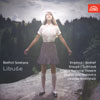Smetana Libuse
Smetana’s setting of the Libuse myth captured in a very fine 1965 recording
View record and artist detailsRecord and Artist Details
Composer or Director: Bedřich Smetana
Genre:
Opera
Label: Czech Opera Treasures
Magazine Review Date: 4/2010
Media Format: CD or Download
Media Runtime: 157
Mastering:
Stereo
ADD
Catalogue Number: SU39822

Tracks:
| Composition | Artist Credit |
|---|---|
| Libuse |
Bedřich Smetana, Composer
Bedřich Smetana, Composer Ivo Zídek, Stáhlav, Tenor Jaroslav Krombholc, Conductor Milada Subrtová, Krasava, Soprano Nadezda Kniplová, Libuse, Soprano Prague National Theatre Chorus Prague National Theatre Orchestra Václav Bednár, Premysl, Baritone Vera Soukupová, Radmila, Mezzo soprano Zdenek Kroupa, Chrudos, Bass |
Author: Mike Ashman
The action – mostly quarrels and tableaux vivants – takes place during the 8th century. The thin plot is motored by two brothers (Chrudos and t’áhlav) in dispute over the woman Libuse’s ruling in a land inheritance question, and her yielding to reality (aka chauvinistic pressure) by taking as husband an enigmatic, Coriolanus-like figure, Premysl, who, it happens, is an old buddy. After singing “Ó vy lípy”, the work’s only nearly-famous aria about the country’s sacred linden trees, Premysl exchanges rural for married bliss and solves the brothers’ quarrel with Libuse’s pacifying advice. Not the end of the story, because this is a “festival opera”. In an interesting mix of her stage contemporaries Dido and Brünnhilde – Isay this to point up Smetana’s modernism, not to accuse him of cribbing that he couldn’t have done – Libuse introduces and commentates on no less than seven “pictures” of future Czech glory and disaster.
Those familiar with the range of instrumental colour and tonal drama that Smetana conjured in Má vlast, or the evocations and imitations of folk music of The Bartered Bride, will feel at home. The composer’s also a dab hand at the big antiphonal brass processionals à la Lohengrin (a Wagner opera he did know) and at creating a rather sexy, bar-breaking choric music for young girls – much like Grieg’s trolls in Peer Gynt.
This 1965 recording is not literally “live” but has that lived-in feeling of having just walked over from theatre to microphone. With Kniplová (a Brünnhilde both on record and for Karajan) a magnificent, tireless Libuse and ubrtová’s subtle take on Radmila (Chrudos’s love), the women lead.
Discover the world's largest classical music catalogue with Presto Music.

Gramophone Digital Club
- Digital Edition
- Digital Archive
- Reviews Database
- Full website access
From £8.75 / month
Subscribe
Gramophone Full Club
- Print Edition
- Digital Edition
- Digital Archive
- Reviews Database
- Full website access
From £11.00 / month
Subscribe
If you are a library, university or other organisation that would be interested in an institutional subscription to Gramophone please click here for further information.




